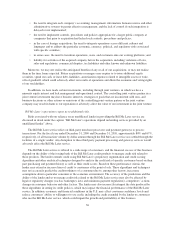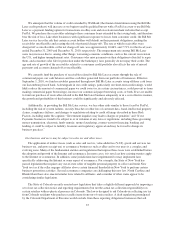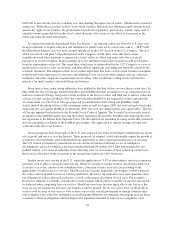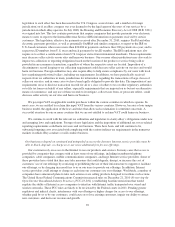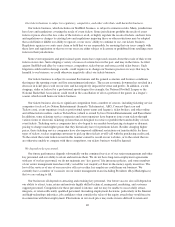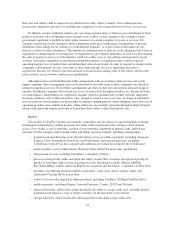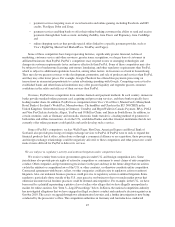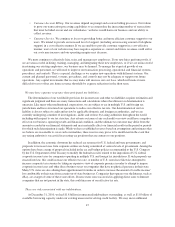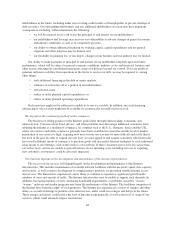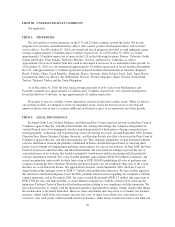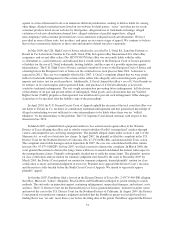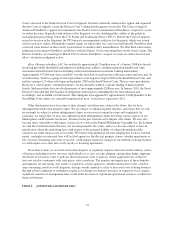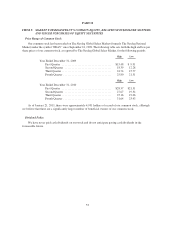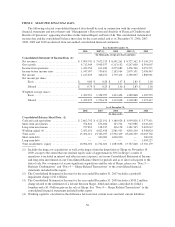eBay 2010 Annual Report Download - page 51
Download and view the complete annual report
Please find page 51 of the 2010 eBay annual report below. You can navigate through the pages in the report by either clicking on the pages listed below, or by using the keyword search tool below to find specific information within the annual report.investigations (now completed) of various actions taken by our businesses. Such claims and investigations, even if
without foundation, typically are very expensive to defend, involve negative publicity and substantial diversion of
management time and effort, and could result in significant judgments against us.
In several jurisdictions, we have taken actions designed to improve the security of transactions and the
quality of the user experience on our websites. Beginning in June 2008, we have required users in the U.K. to
offer PayPal as a payment alternative on most transactions on our localized U.K. website, and since October
2008, we have required sellers on eBay.com to accept one or more accepted payment methods (currently PayPal,
credit or debit cards processed through Internet merchant accounts, ProPay, Moneybookers and Paymate) and no
longer allow any forms of paper payment, including checks and money orders, to be listed by sellers in the U.S.
for most categories of items. While these initiatives are intended to improve and make safer our users’ buying
experience and/or increase activity on our sites, certain users may be negatively affected by or react negatively to
these changes, and may allege that we have (and are abusing) market power. We currently face inquiries from
government regulators in various jurisdictions related to such actions. For example, both the Australian
Competition and Consumer Commission and the Reserve Bank of Australia recently reviewed our policies
requiring sellers to offer PayPal as a payment alternative on most transactions on our localized Australian
website and precluding sellers from imposing a surcharge or any other fee for accepting PayPal or other payment
methods. We may face similar inquiries from other government regulators in the future. Negative reactions to
these changes by our users or government authorities could, among other things, force us to change our operating
practices in ways that could harm our business, operating results and profitability.
Our business may be adversely affected by factors that cause our users to spend less time on our websites,
including seasonal factors, national events and increased usage of other websites.
Anything that diverts our users from their customary level of usage of our websites could adversely affect
our business. We would therefore be adversely affected by geopolitical events such as war, the threat of war, or
terrorist activity, and natural disasters, such as hurricanes or earthquakes. Similarly, our results of operations
historically have experienced seasonal fluctuations because many of our users reduce their activities on our
websites with the onset of good weather during the summer months, and on and around national holidays. In
addition, increased usage of social networking or other entertainment websites may decrease the amount of time
users spend on our websites, which could adversely affect our financial results.
Our failure to cost-effectively manage certain aspects of our business could harm us.
We have expanded our headcount, facilities, and infrastructure in the U.S. and internationally, and anticipate
that further expansion in certain areas will be required for some of our businesses. This expansion has placed,
and we expect it will continue to place, a significant strain on our management, operational, and financial
resources. The areas that are put under strain by our growth include the following:
•Website Stability. We must constantly add new hardware, update software and add new engineering
personnel to accommodate the increased use of our and our subsidiaries’ websites and the new products
and features we regularly introduce. This upgrade process is expensive, and the increased complexity of
our websites and the need to support multiple platforms as our portfolio of brands grows increases the
cost of additional enhancements. Failure to upgrade our technology, features, transaction processing
systems, security infrastructure, or network infrastructure in a cost-effective manner to accommodate
increased traffic or transaction volume or changes to our site functionality could harm our business.
Adverse consequences could include unanticipated system disruptions, slower response times,
degradation in levels of customer support, impaired quality of users’ experiences of our services, impaired
quality of services for third-party application developers using our externally accessible APIs and delays
in reporting accurate financial information. We may be unable to effectively upgrade and expand our
systems in a timely manner or smoothly integrate any newly developed or purchased technologies or
businesses with our existing systems, and any failure to do so could result in problems on our sites.
Further, steps to increase the reliability and redundancy of our systems are expensive, reduce our margins,
and may not be successful in reducing the frequency or duration of unscheduled downtime.
46


